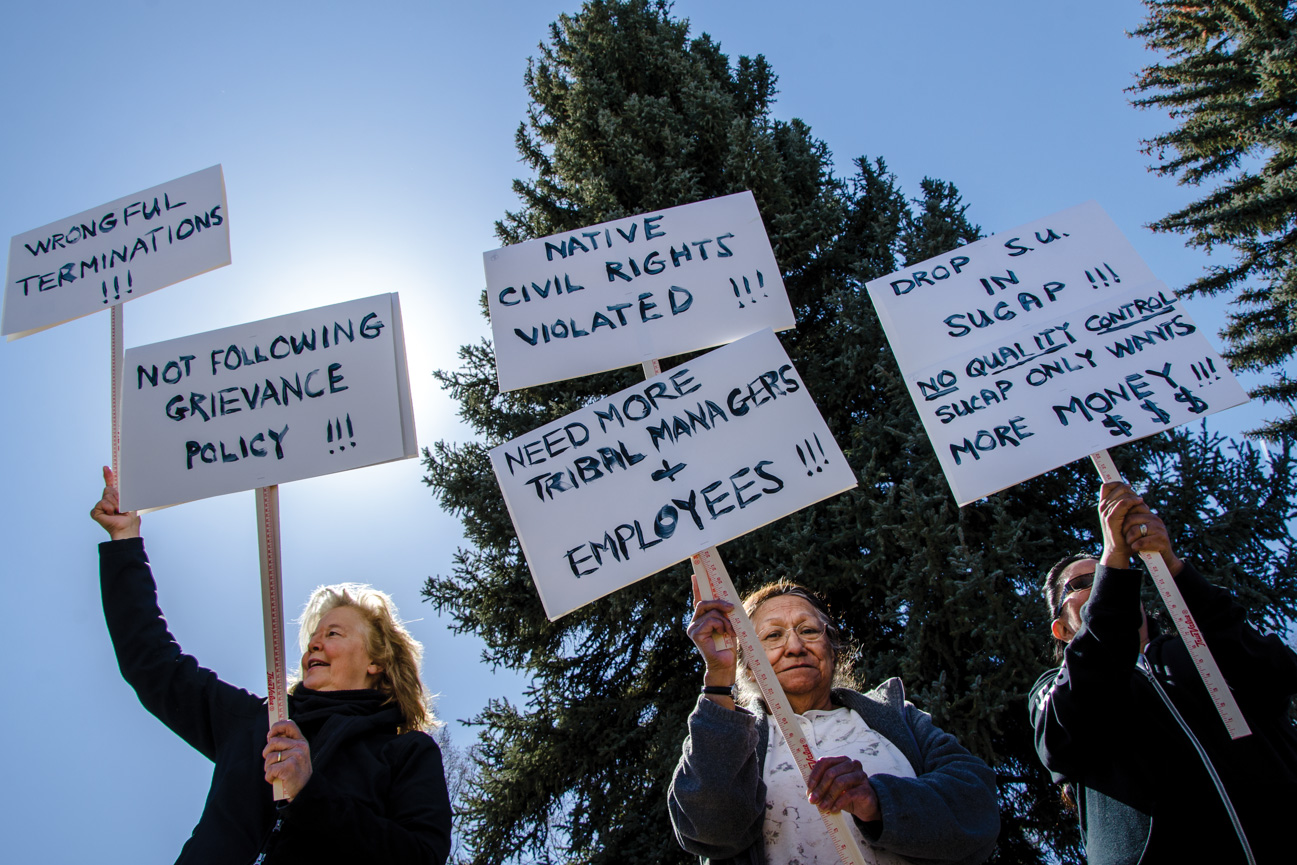Last week, protesters gathered outside the steps of the Southern Ute Community Action Program (SUCAP) building to object a matter of issues, which according to the protesters involves unfair treatment to employees, lack of responsibility by management, and violation of civil rights.
Fingers were pointed, and accusations were fueled, all resulting in white placards with the words, “Drop the SU in SUCAP” and “Tribal traditions and culture disregarded” sketched across.
The protest first started after a number of employees criticized the establishment for wrongful termination. Southern Ute tribal elder, Judy Lansing, who has worked at SUCAP for 30 years, is one of those who claim she was wrongfully terminated as well as not being allowed to file a grievance when the decision was made. She stated that these actions were unfair, incompetent, and abused her civil rights as an employee.
“There have been many violations with civil rights here,” Lansing said. “They don’t even follow their own grievance policy … we are fighting to get our jobs back.”
Lansing claims that her termination dates back to May 2014 when a superior informed her that she failed to work on required Saturdays.
According to Lansing, she was told previously that she didn’t have to work on those days. Linda Mahlum, who worked for SUCAP for eight years, stated she too was terminated under the same actions as Lansing for not working on appropriate days.
“The business has always had unfair treatment of employees,” Mahlum claimed. “It’s not right for them to do this.”
In the midst of the blame and criticism, SUCAP in return spoke on their behalf, stating their decisions were rational and remained in the boundaries of standard policy procedures.
Eileen Wasserbach, executive director of SUCAP, commented that the board of directors made a thorough investigation with the issue, and that the evidence doesn’t support what the protesters are saying.
“There were two employees who were going to be terminated but were given the opportunity to resign. They felt like it was unjust. They used SUCAP’s grievance policy and got a hearing from [SUCAP’s board of directors]. It was there that the board made a determination that SUCAP’s policies were apporpirately followed. The employees hoped for a different outcome, but it’s been thoroughly investigated by the board of directors. The two employees said that they have been fired for not working Saturday when their absence for Saturdays was approved, and there’s just no evidence of that”
Wasserbach added that this isn’t the first time employees have run into problems with the procedures.
“We’ve had employees file grievance procedures before. There’s a series of steps that must be taken, and it seems like very few go all the way to the board,” she said. “Usually they are filed when the employee is no longer working.”
According to Wasserbach, SUCAP is known to be one of the largest nonprofit organizations in Southwest Colorado. It has an annual budget of $7 million, and gets a majority of its funding from government grants.
Joe Poynter, former SUCAP employee and now advocate, wasn’t so lenient on SUCAP’s policy procedures.
“They basically hijacked the programs,” he said. “When I first came here, I took up the offer because of the area, and I wanted to work with the native people … I’ve been here for thirteen years, and things were going good for the first seven, until the original director, Rick Jefferson, left.” he said.
Poynter said that the issues were taken to the Southern Ute Indian Tribal Council, but since SUCAP is a separate entity, there was not much Tribal Council could do.
“They stated that SUCAP is separate entity from them that they have no jurisdiction over them. So my question is: who is accountable to these individuals? No one is … it hurts the community ultimately,” Poynter said. “If you’re not being held accountable by the state, then you should be held accountable by the sovereign people on their sovereign land.”
Workplace controversies are one of the more difficult things to form an opinion on, due to the separate stories from both parties. Eileen Wasserbach stated that she understands the outcry SUCAP is receiving, but they are always open-minded for any of those who have questions regarding the protest or their policies.
“I understand that they’re angry,” she said. “My own thought is that if our goal is to provide really high quality services to the community, then that has to remain our goal,” she said. “It’s not really a matter of being inflexible regarding the needs of our employees, it’s a matter of making a choice to contribute to high quality services. I just encourage anyone to ask questions if they find something that doesn’t make sense.”
Poynter concluded that the fight for civil rights is still strong, and that the community needs to be aware of the happenings going around the Southern Ute Indian Reservation.
“Civil rights have been violated,” Poynter said. “Judy Lansing is representing her culture and her people. She’s been there for thirty years. There’s a lot of shady stuff going on. I’d like to know who is really responsible.”

